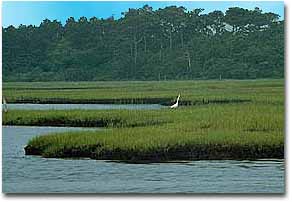
Listed as an endangered species in 1967, the Delmarva fox squirrel has been steadily increasing in numbers in Maryland. LeCompte's 485 acres of mature oak and loblolly pine forests were set aside to provide a refuge for this native squirrel. From the productive population of Delmarva fox squirrels on LeCompte, wildlife biologists have trapped and relocated squirrels to likely habitats in Maryland, Delaware and Virginia, thereby helping to re-establish their populations. Lecompte also boasts model agricultural fields maintained by wildlife biologists for the benefit of numerous wildlife species.
What To See
A walk around the field edges or the forest trails will always reward the visitor with a good look at the Delmarva fox squirrel. Visitors on an early morning forest hike in the spring might hear the melodious gobble of a wild turkey. Wild turkeys disappeared from Maryland's Eastern Shore about 200 years ago. LeCompte WMA was the first Eastern Shore site chosen for release of turkeys trapped from the wild in Western Maryland. Habitat management practices for rabbits, quail and woodcock are demonstrated here and these species can be seen throughout the established agricultural fields and forest edges.
What To Do
Hunters will find white-tailed deer and sika deer, which is a species imported to Maryland from Asia. There is a hunting area for the physically challenged. Cottontail rabbits, bobwhite quail and woodcock will reward the small game hunter with a bountiful harvest. Squirrel hunting is not permitted because of the significant presence of Delmarva fox squirrels. Bird-watchers and hikers will enjoy the many trails that crisscross the forest.
Area Regulations
- Use of LeCompte WMA is generally permitted seven days a week throughout the year.
- Hunting is allowed in accordance with open seasons and shooting hours, except special restrictions applying for waterfowl, doves and squirrels.
- All State and Federal Hunting Laws and Regulations are applicable.
- No squirrel hunting is permitted at any time.
- Trapping by permit only.
- Dove hunting is restricted to certain days and shooting hours.
Special Areas
- Disabled hunters wishing to use the accessible hunting zone must first obtain a Hunt from a Vehicle Permit, before they can obtain an Access Permit from the LeCompte WMA Office. Both permits are free and are required to utilize the accessible hunting accommodations.
- Only ATV’s, UTV’s and golf carts are permitted in the accessible hunting zone.
- Accessible waterfowl blinds on the 35-acre impoundment are available one day per week by reservation to those hunters with HFV and Access Permits.
- Trail system noted on the map is suitable for hiking and birding as well as hunting.
- Some fields are managed as Special Dove Areas.
Non-hunting Users Guide
- Non-hunting visitors are welcome. Be aware of open hunting seasons and visit accordingly. Season dates are available in newspapers, on the Internet and at some area stores.
- Trails are maintained but not actively marked.
- Expect wet footing most of the year.
- Mature hardwood and loblolly pine forests surround many of the trails and support a rich variety of songbirds and other wildlife species.
Site Management Goals
- Providing habitat for the federally-endangered Delmarva fox squirrel is the overriding goal of LeCompte WMA. This area is both a refuge and study area for this species. It has served as a donor site for reintroduction of this squirrel to other locations within its original range.
- Delmarva fox squirrels relish field corn and plots are planted annually for this reason.
- The agricultural fields at LeCompte provide habitat and winter food for game and non-game wildlife. Other species routinely using the agricultural lands are: white-tailed and sika deer, wild turkeys, mourning doves, bobwhite quail, cottontail rabbits, song birds and waterfowl.
- A 35-acre impoundment was built to provide wintering habitat for ducks.
 Directions
Directions
From Vienna, Md., take Elliott Island Road south, turn onto Steele Neck Road as it forks to the right and follow Steele Neck Road four miles to LeCompte WMA on the left. Access via two parking areas located off Steele Neck Road. For additional information, contact the LeCompte Wildlife Office at (410) 376-3236.
 Click Here for Map
Click Here for Map
This area is a part of Maryland’s Department of Natural Resources public land system and is managed by the Wildlife and Heritage Service. The primary mission of the WMA system is to conserve and enhance wildlife populations and their respective habitats as well as to provide public recreational use of the State’s wildlife resources.
Eighty-five percent of the funding for Maryland's state wildlife programs comes from hunting license fees and a federal excise tax on sport hunting devices and ammunition. The federal aid funds are derived from the Federal Aid in Wildlife Restoration (or Pittman-Robertson) Fund, which sportsmen and women have been contributing to since 1937. Each state receives a share of the funds, which is administered by the U. S. Fish and Wildlife Service; these funds are used for wildlife conservation and hunter education programs, including the management of the WMA system.
Other sources of funds for land acquisition include Program Open Space Funding for Maryland's State and local parks and conservation areas, provided through The Department of Natural Resources' Program Open Space. Established in 1969, Program Open Space symbolizes Maryland's long-term commitment to conserving natural resources while providing exceptional outdoor recreation opportunities.